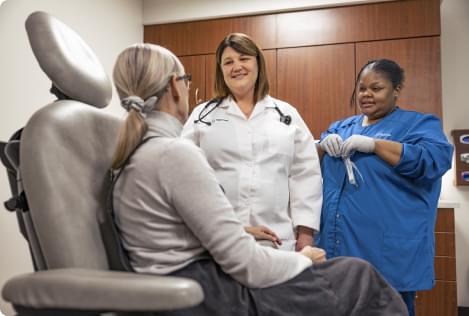Overview
Hypoparathyroidism is a rare condition in which the body doesn't make enough of a key hormone called parathyroid hormone (PTH). PTH helps control and maintain the right balance of two minerals in the body: calcium and phosphorus.
With hypoparathyroidism, too little PTH leads to unusually low levels of calcium in the blood. It also leads to high levels of phosphorous in the blood.
Treatment for the condition includes supplements and medicines to bring calcium and phosphorus levels into healthy ranges. Depending on the cause of hypoparathyroidism, you'll likely need to take supplements for the rest of your life.

Symptoms
Symptoms of hypoparathyroidism often are related to low calcium levels in the blood. The symptoms can include:
- Tingling or burning in the finger, toes and lips.
- Muscle aches or cramps in the legs, feet, stomach or face.
- Twitching or spasms of muscles, mainly around the mouth but also in the hands, arms and throat.
- Tiredness or weakness.
- Headaches.
- Trouble with memory.
When to see a doctor
Get a healthcare checkup if you think you might have symptoms of hypoparathyroidism. Call your healthcare professional right away if you have a seizure or trouble breathing. Hypoparathyroidism can lead to either of these medical problems.
Causes
Hypoparathyroidism happens when the parathyroid glands don't make enough parathyroid hormone. There are four small parathyroid glands in the neck near the thyroid gland.
Parathyroid hormone controls the levels of calcium and phosphorus in the body. So, too little parathyroid hormone causes irregular levels of:
- Calcium. This mineral is stored in bones and teeth, and it makes them hard. Calcium also plays other key roles. It's needed for muscles to work. It helps the nerves and brain work properly. And it's needed to control heart rhythm and blood pressure.
- Phosphorus. This mineral is found in all cells, but mostly in the bones. Phosphorus is needed to help the body create energy from food. Phosphorus also helps the muscles, nerves, heart and kidneys work.
Causes of hypoparathyroidism can include:
- Neck surgery. This is the most common cause of hypoparathyroidism. The condition can happen after the parathyroid glands get damaged by mistake or removed during surgery. Neck surgery may be done to treat conditions of the thyroid gland, or to treat throat or neck cancer.
- Autoimmune disease. With this type of condition, the body's defenses attack healthy tissue by mistake. When the parathyroid glands are attacked, they stop making their hormone.
- Hereditary hypoparathyroidism. This condition runs in families. It can result from being born without parathyroid glands or with glands that don't work correctly. Some types of hereditary hypoparathyroidism are linked with deficiencies of other glands that make hormones.
- Low levels of magnesium in the blood. Low magnesium levels can affect how well the parathyroid glands work. Healthy magnesium levels are needed for the parathyroid glands to make enough PTH hormones.
- Extensive cancer radiation treatment of the head or neck. Radiation can destroy the parathyroid glands. Rarely, a type of radiation treatment for thyroid diseases called radioactive iodine may lead to hypoparathyroidism.
Risk factors
Factors that can raise the risk of hypoparathyroidism include:
- Recent neck surgery, especially if the thyroid was involved.
- A family history of hypoparathyroidism.
- Having certain autoimmune or hormone-related conditions, such as Addison's disease. Addison's disease causes the adrenal glands to make less of their hormones.
Complications
Hypoparathyroidism can lead to other health conditions. Some of these conditions can be reversed with treatment. Others can't be reversed.
Complications that can be reversed
Some conditions that stem from hypoparathyroidism are due to low calcium levels. These may get better with treatment. They include:
- Cramp-like spasms of the hands and fingers that can be painful and last a long time.
- Muscle pain and twitches or spasms of the muscles of the face, throat or arms. When these spasms happen in the throat, they can make it harder to breathe. This may require emergency medical care.
- Tingling or burning feelings in the lips, tongue, fingers and toes. They may feel like pins and needles.
- Seizures.
- Problems with kidney function, such as kidney stones and kidney failure.
- Irregular heart rhythms and fainting. Hypoparathyroidism also can cause the heart to have trouble pumping enough blood. This is a condition called heart failure. Most often, it can't be cured.
Complications that often can't be reversed
Treatment might prevent these health conditions or keep them from getting worse. But once they happen, taking calcium and vitamin D most often doesn't reverse the damage. These complications include:
- Hardening and changes in the shape of bones, and poor growth.
- Delayed mental development in children.
- Calcium buildups in the brain. These can cause trouble with balance and movement. They also can cause seizures.
- Clouded vision due to cloudy areas in the lenses of the eyes, called cataracts.
- Teeth that don't form properly, affecting dental enamel and roots. This can happen when hypoparathyroidism happens at an early age when teeth are coming in.
Prevention
There are no specific steps to take to prevent hypoparathyroidism. But if you're scheduled to have thyroid or neck surgery, talk to your surgeon. Ask about the risk of damage to your parathyroid glands during the procedure. Before surgery, your healthcare professional may choose to test your calcium, parathyroid hormone and vitamin D levels. Your care professional also may have you start taking supplements if needed.
If the risk for hypoparathyroidism after surgery is high, your surgeon may suggest a procedure to lower the risk. It involves moving one or two of the parathyroid glands into a muscle toward the front of the neck. The procedure is called parathyroid autotransplantation, and it's done during the surgery. Sometimes, the surgeon may need to move parathyroid tissue to another area of the body, such as the forearm. Transplanted parathyroid tissue does not always work properly.
If you've had surgery or radiation involving your thyroid or neck, be aware of possible hypoparathyroidism symptoms. These can include a tingling or burning feeling in the fingers, toes or lips, or muscle twitching or cramping. If you get symptoms, your healthcare professional might recommend prompt treatment with calcium and vitamin D. This can lessen the effects of hypoparathyroidism.
Diagnosis
To find out if you have hypoparathyroidism, your healthcare professional may start by asking you about your medical history. You're also given a physical exam. Your care professional may suggest blood and urine tests too.
Blood tests
The following blood test results might suggest hypoparathyroidism:
- A low level of calcium in the blood.
- A low level of parathyroid hormones.
- A high level of phosphorous in the blood.
The level of magnesium in your blood also might be checked. A low level of magnesium may cause a low blood-calcium level.
Urine test
Parathyroid hormones act on the kidneys to prevent too much calcium from going into in the urine. A urine test can tell whether your body is getting rid of too much calcium.
Other tests
Your healthcare professional may suggest more tests. These might include other blood tests or a test to check your heart's rhythm, called an electrocardiogram.
Treatment
Hypoparathyroidism treatment aims to ease symptoms and bring calcium and phosphorus levels in your body back into healthy ranges.
Treatments include:
- Oral calcium. These calcium supplements are taken by mouth as tablets, chews or liquid. They can raise calcium levels in your blood. In high amounts, they can cause side effects such as constipation in some people.
- Vitamin D. High amounts of vitamin D can help your body absorb calcium and get rid of phosphorus. Often, this vitamin D is a prescription supplement called calcitriol. It's different from the usual supplements you can get without a prescription.
- Magnesium. If your magnesium level is low and you have symptoms of hypoparathyroidism, you may need to take a magnesium supplement.
- Thiazide diuretics. These medicines may be used if your calcium levels stay low even with treatment. They also might be used if the amount of calcium in your urine is very high. Thiazide diuretics can help lessen the amount of calcium lost in urine.
- Parathyroid hormone replacement. A type of medicine that replaces parathyroid hormones, called Natpara, has been available to treat hypothyroidism. But that medicine is being phased out. A newer type of medicine that replaces parathyroid hormones has been tested in clinical trials. It hasn't yet been approved in the United States.
Diet
Your healthcare professional might recommend that you talk with a registered dietitian. The dietitian is likely to suggest a diet that's:
- Rich in calcium. This includes dairy products, green leafy vegetables and broccoli. It also includes foods with added calcium, such as some orange juices and breakfast cereals.
- Low in phosphorus. This means you don't have carbonated soft drinks, which contain phosphorus in the form of phosphoric acid. You also limit processed foods, meats, hard cheeses, nuts and whole grains.
Calcium infusion
If you need symptom relief right away, you may receive calcium through a needle in a vein. This is called an intravenous (IV) infusion. Most often, it's done in the hospital. You'll likely also take vitamin D tablets by mouth. After you leave the hospital, you keep taking calcium and vitamin D tablets.
Monitoring
Your healthcare professional likely will do blood tests to check your calcium and phosphorus levels on a regular basis. At first, these tests probably will be weekly to monthly. In time, you may need blood tests just once or twice a year. Regular testing lets your care professional change the amount of calcium you take if your levels rise or fall.
Because hypoparathyroidism most often is a long-lasting disorder, testing and treatment tends to be lifelong.
Preparing for your appointment
You'll likely start by seeing your primary care professional. You might then be referred to a doctor called an endocrinologist, who treats hormone disorders.
Here's some information to help you get ready for your appointment.
What you can do
When you make the appointment, ask if there's anything you need to do in advance. For example, you may be told not to eat for a certain number of hours the night before a test. Take a family member or friend with you to the appointment if you can. A loved one can help you remember the information you're given.
Before your appointment, make a list of:
- Your symptoms. Include any that don't seem related to the reason for your appointment. Note when the symptoms began
- Key personal information. Include major stresses or recent life changes and your medical history as well as your family's medical history.
- All medicines, vitamins, herbs and other supplements you take. Include the doses you take.
- Questions to ask your healthcare professional.
Questions to ask may include:
- What is the likely cause of my symptoms? Are there other possible causes?
- What tests do I need?
- Is my condition likely short-term or long-term?
- What treatments are available, and which do you recommend?
- Are there alternatives to the main treatment approach you're suggesting?
- How can I best manage this condition with my other health conditions?
- Should I see a specialist?
- Do I need to change my diet?
- Are there brochures or other printed material I can take? What websites do you recommend?
Feel free to ask other questions during your checkup.
What to expect from your doctor
Your healthcare professional is likely to ask you questions such as:
- Have you recently had surgery involving your neck?
- Have you received radiation therapy to your head or neck or therapy for treatment of thyroid problems?
- Has anyone in your family had symptoms like yours?
- Do your symptoms happen all the time of just some of the time?
- How bad are your symptoms?
- What, if anything, seems to make your symptoms better?
- What, if anything, seems to make your symptoms worse?
© 1998-2026 Mayo Foundation for Medical Education and Research (MFMER). All rights reserved. Terms of Use


